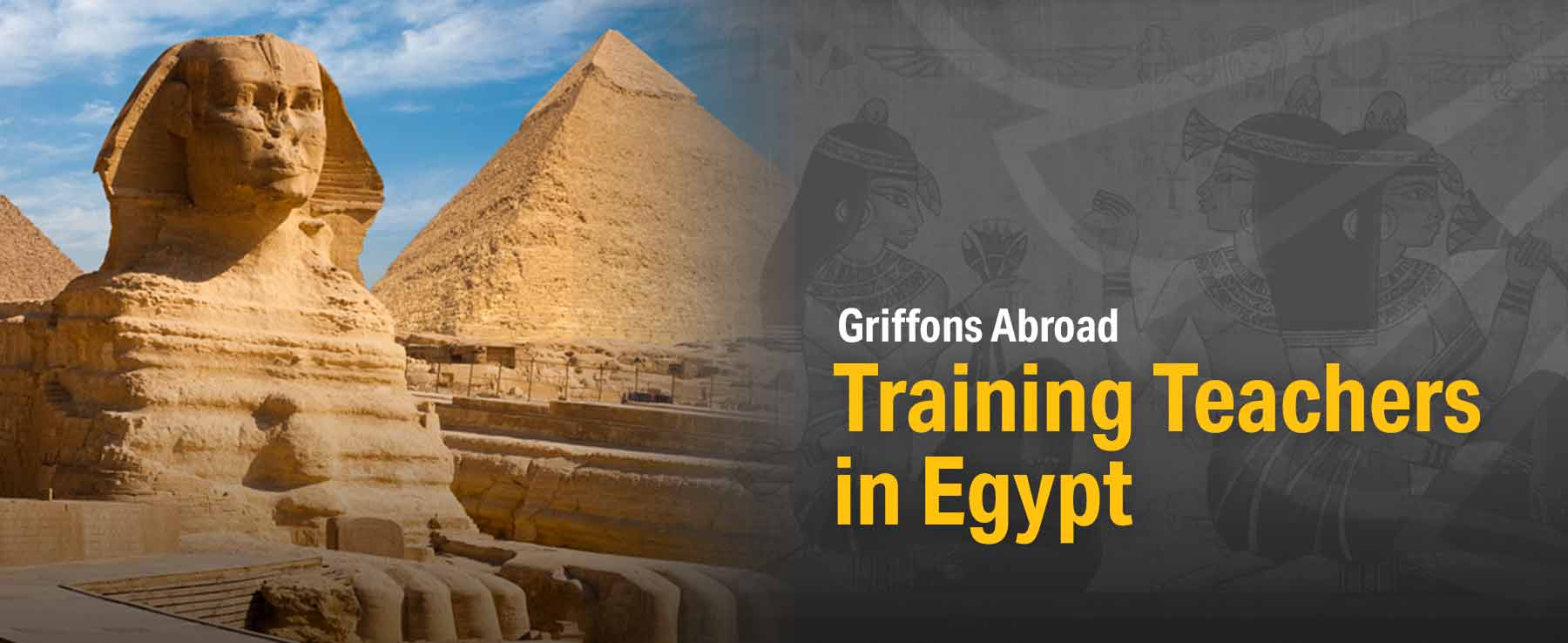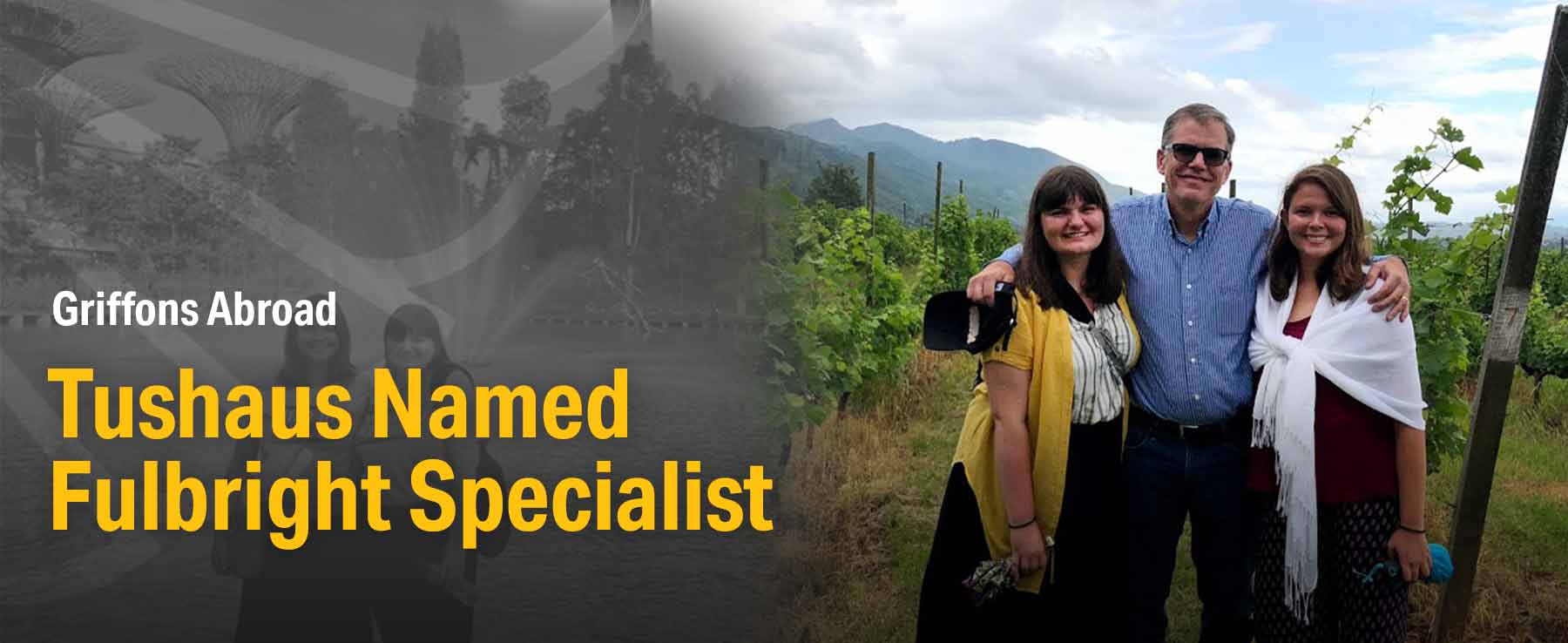
Training teachers in Egypt
Dr. Adrienne Johnson spent two weeks in Cairo this past spring when she was selected for an English Language Specialist assignment for the U.S. Department of State. Just 80 people from the United States are selected in the program each year.
Dr. Johnson, assistant professor of education and coordinator of the graduate-level TESOL (Teaching English to Speakers of Other Languages) program, spent six days of her trip training 20 mentor teachers, who then returned to their elementary schools to train teacher mentors.
“The teachers were funny, kind and eager to learn,” Dr. Johnson said. “They were one of the easiest groups I’ve ever worked with.”
She also attended the two-day NileTESOL Conference XXIII at the American University in Cairo, on the New Cairo campus. Dr. Johnson gave a talk to all the conference attendees about leaving your comfort zone and moving into a growth zone, a favorite topic in her Missouri Western classes.
While at the conference, she also served on a panel about teacher needs in the 21st century and gave a presentation on interactive strategies for working with young language learners. More than 500 attended that presentation.
“I feel very fortunate that I got to do something I love to do,” Dr. Johnson said of her time in Egypt. She said that since she is always asking her students to step outside their comfort zone and learn something new, she was pleased that she was able to do that. It was her first time in Egypt, her first time in a predominantly Muslim country and her first time in an Arabic-speaking country.
“I require my students to attempt to learn a foreign language, so it was good for me to do that, too.”
Dr. Johnson joined Missouri Western in the fall of 2013, and she teaches both undergraduate and graduate courses. She earned bachelor’s degrees in psychology and Spanish from the University of Denver, a master’s in education from National Louis University in Chicago, and a doctorate and master’s in linguistics from the University of Kansas.
Her specialties include young learners, English as a second language and bilingual programming, and first and second language acquisition. Her career has included several years of working with elementary-aged language learners.
“I went to Egypt to teach others, but I probably learned the most,” she said. “I was grateful to deepen my understanding of another culture and its people. It was an awesome experience.”
Legal terms in Myanmar
Understanding legal jargon is difficult enough for the average layperson to understand, but try teaching those terms to someone who doesn’t speak English. That’s just what Kaylee Sharp ’19 and Britane Hubbard ’19 did in Myanmar last summer for law students at Taunggyi University.
Sharp and Hubbard developed the two-week curriculum since they were the first students from the United States to teach the course. They had access to the lesson plans of a group from Australia who had taught there the year before, but unfortunately, those plans didn’t work too well for the women. In the Australians’ class the year prior, the students had some command of the English language, but Sharp and Hubbard’s students knew no English at all.
“We had to do a lot of reworking,” Sharp said. “But by the end, everyone was having a blast and it was wonderful.” She said that since the class was optional for the students, she and Hubbard wanted to make sure it was worthwhile for them.
“We had never taught before so it was very challenging, but the students were so grateful to learn English,” Hubbard said. “It felt like we were making a definite difference. They were sad to see us leave.”
“It was a really incredible learning experience,” Sharp said. “It was life-changing, and I’ll be forever grateful for the experience.”
Last December, the two women gave a presentation at an international conference in Australia about their service in Myanmar. And this past January, thanks to webcams and the internet, the two women trained the next group of teachers and shared their lesson plans.
Hubbard returned to Myanmar this past summer for six weeks. Along with teaching English, she is helping Dave Tushaus, professor of legal studies, develop law clinic courses (see “Professor selected as Fulbright Specialist”).
Sharp and Hubbard, who both graduated this past May, took full advantage of opportunities as college students. They participated in a study away trip to Washington, D.C., Sharp went to Portland, Oregon for another and Hubbard traveled to Memphis, Tennessee.
Hubbard, a native of Linneus, Missouri, graduated with a degree in criminal justice with a legal studies concentration and began Missouri Western’s master’s program in forensic investigation this fall.
As a freshman at Missouri Western, she enrolled in an honors colloquium on election law that was taught by Tushaus, and she worked with him on research projects every year since. This past academic year, Hubbard helped plan four pro bono legal clinics for the campus and community. She also gave presentations on her honors research at several national conferences throughout her Missouri Western career.
Sharp, a native of Savannah, Missouri, participated in an independent study course every year with Dr. Edwin Taylor, associate professor of political science, and presented her research on environmental justice and racism, and genocide at national conferences.
“Dr. Taylor really wants to make sure that political science is more than just watching the news,” Sharp said.
She spent the spring 2019 semester in Jefferson City serving as an intern for State Sen. Jill Schupp from the 24th district near St. Louis.
“It was great to do all this with Missouri Western,” Sharp said. “I feel like my degree is a lot more valuable.”

Professor selected as Fulbright Specialist
When Kaylee Sharp ’19 and Britane Hubbard ’19 served in Myanmar in the summer of 2018, they were accompanied by Dave Tushaus, professor of legal studies. He served as an international clinician in residence for a month at Taunggyi University. The three worked with an NGO (non-governmental organization) called Babseacle, whose mission is to create greater access to justice worldwide.
This past summer, Tushaus returned to Myanmar to serve as a Fulbright Specialist.
In the summer of 2018, Tushaus worked with more than 100 law students there to develop a community teaching program and create a mini-clinic to conduct a community needs assessment. He continued to work with a law student and faculty member from Myanmar even after he returned to the United States.
This past summer, he built on that foundation, working to help them establish a legal clinic as part of their law school that will become a model for other universities in Myanmar.
This is Tushaus’s second stint as a Fulbright Specialist. In 2017, he spent six weeks assisting the University of The Gambia Faculty of Law with its clinical legal program. In 2012, Tushaus was selected as a Fulbright Scholar for the fall semester. He helped law students expand their legal aid clinic at Banaras Hindu University in Varanasi, India and gave lectures and workshops on the subject.
“Legal clinics are a very effective way to give people access to justice,” Tushaus said.
